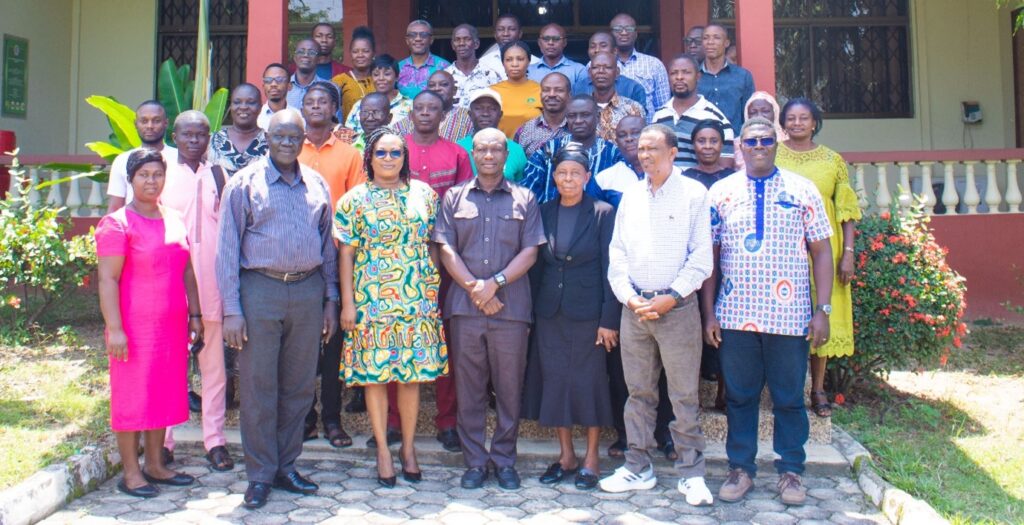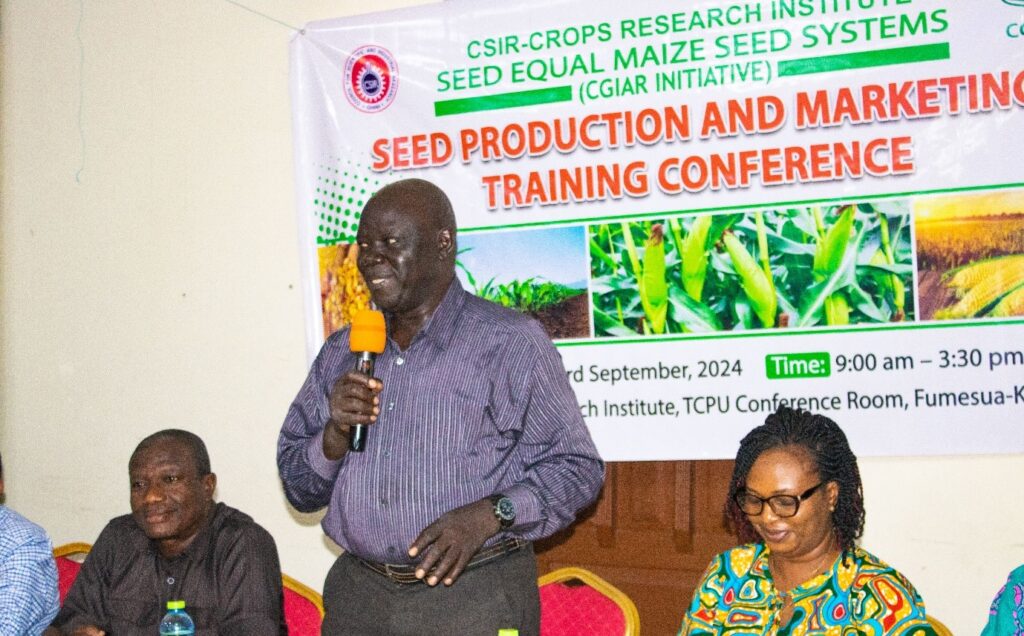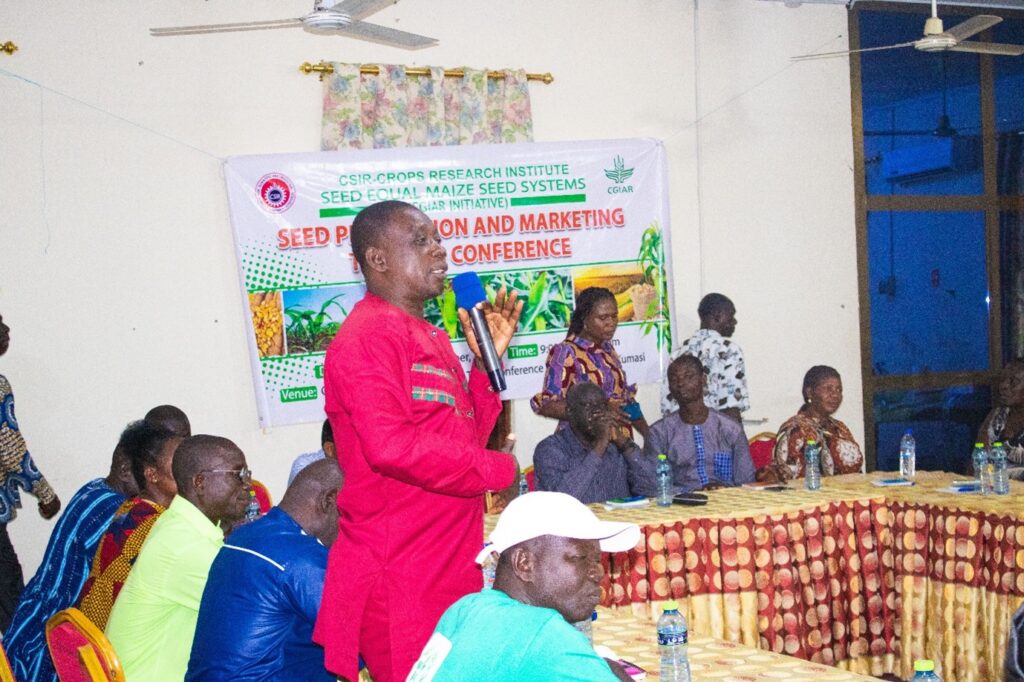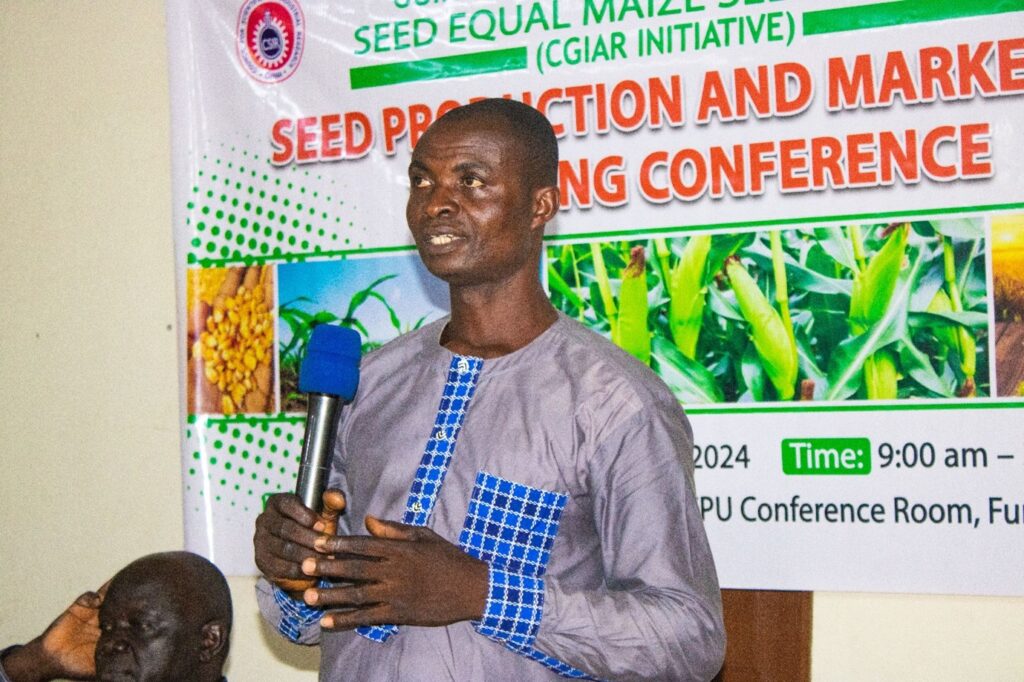SEED PRODUCERS TRAINED IN ADVANCED TECHNIQUES FOR SEED PRODUCTION AND MARKETING

In a significant effort to enhance agricultural productivity and improve farmers’ livelihoods, the CSIR-Crops Research Institute (CSIR-CRI) has conducted a comprehensive training program focused on seed production and marketing. Organized under the Seed Equal Systems Project from the International Institute of Tropical Agriculture (IITA), the training aimed to equip participants with cutting-edge techniques in seed production and effective marketing strategies.
The training brought together over sixty (60) seed produces, seed inspectors, seed aggregators, technicians and marketers from various regions of the country.

The Seed Equal project aims to support the delivery of seeds of improved, climate-resilient, market-preferred and nutritious varieties of priority crops, embodying a high rate of genetic gain to farmers, ensuring equitable access for women and other disadvantaged groups.
In his opening remarks, the Acting Director of CSIR-CRI, Dr. Ernest Baafi highlighted the numerous challenges facing the country’s seed system, including low yields, inadequate capacity for seed multiplication, limited market information, adulterated seeds, and poor packaging. He emphasized how these issues impact crop yields, farmer incomes, and food security. He expressed optimism that the training would contribute to the overall development of Ghana’s agricultural sector.

The sessions were led by agricultural experts and covered a wide range of topics, including high quality seed production, seed purity and viability, effective seed marketing and distribution as well as seed field inspection, certification and standard regulations. Additionally, participants were educated on the latest market trends, branding strategies, and effective distribution channels to enhance their market reach and profitability.
Dr. Sylvestro Meseka, a maize scientist and the Programme Manager of the Seedequal project at IITA, who graced the occasion, expressed his excitement with the training and urged participants to take full advantage of the knowledge they would gain to increase their production capacities. He thanked the CSIR-CRI for hosting the training and pledged future collaborations with the Institute. His sentiments were also shared by Dr. Wende Mengesha, also from IITA, who urged seed produces to concentrate more on producing hybrid varieties over open-pollinated varieties (OPVs). “Hybrid varieties will yield more and will attract a higher market prices so any investments made into that can be recouped over time”, he stressed.

One of the highlights of the event was a presentation by Madam Happy Anita Appiah-Kubi of the GSID[MOU1] of the Ministry of Food and Agriculture (MOFA). She introduced the Plants and Fertilizer Act of 2010, explaining its relevance to seed production and the quality control mechanisms in place.

Mr. Eric Baffoe of CSIR-CRI also provided insights into agronomic practices crucial for producing high-quality seeds. He emphasized the importance of managing water, nutrients, weeds, and pests to ensure optimal seed quality.


Presentations on effective seed marketing and distribution, seed certification and standards as well as best practices in the seed production value chain were made by experts in the respective fields.
Dr. Priscilla Francisco Ribeiro, the Seed Equal project lead at the Institute, reiterated the critical role of seed production in securing the country’s food future. “To feed the future, you have to seed the future,” she remarked, thanking the Seedequal project for their sponsorship and pledging to work diligently toward achieving the project’s goals.

The acting Director of the CSIR-CRI, in his closing remarks, emphasized the critical role that quality seeds play in achieving food security and improving crop yields. “The success of our agricultural sector heavily relies on the availability of high-quality seeds. By equipping our seed producers with the necessary skills and knowledge, we are not only enhancing their capacity but also contributing to the overall growth of our agricultural economy,” he stated.
Participants expressed their appreciation for the training, noting that the new knowledge and skills acquired would significantly impact their seed production businesses. “This training has been an eye-opener. I have learned so much about the importance of seed quality and how to effectively market my products. I am confident that my business will grow as a result,” said one of the participants, a seed producer from the Ashanti region.

Looking ahead, CSIR-CRI plans to conduct follow-up sessions and provide continuous support to the trainees. This will include field visits, access to new research findings, and the establishment of a network for seed producers to facilitate knowledge sharing and collaboration.

The success of this training program is expected to have a ripple effect across the agricultural sector, leading to higher crop yields, improved food security, and better incomes for farmers. As the demand for high-quality seeds continues to grow, initiatives like this will play a crucial role in ensuring that local producers are well-equipped to meet the needs of the market.
The CSIR-Crops Research Institute remains committed to its mission of driving agricultural innovation and supporting the country’s journey towards food security and economic growth.
Authors: Bernard Sakyiamah, Dr. Priscilla F. Ribeiro, Enoch Bobie Agyemang

